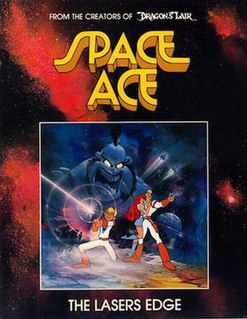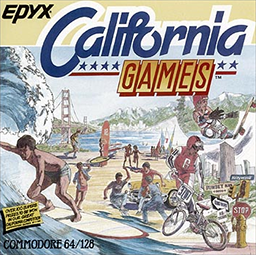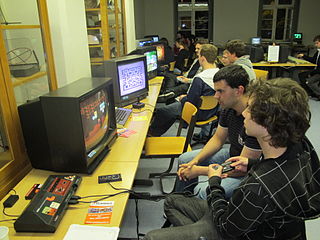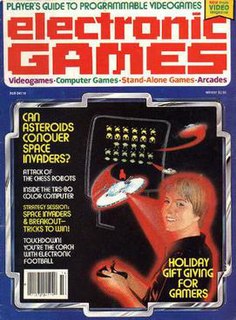Related Research Articles
A role-playing video game is a video game genre where the player controls the actions of a character immersed in some well-defined world, usually involving some form of character development by way of recording statistics. Many role-playing video games have origins in tabletop role-playing games and use much of the same terminology, settings and game mechanics. Other major similarities with pen-and-paper games include developed story-telling and narrative elements, player character development, complexity, as well as replay value and immersion. The electronic medium removes the necessity for a gamemaster and increases combat resolution speed. RPGs have evolved from simple text-based console-window games into visually rich 3D experiences.
A full-motion video (FMV) is a video game narration technique that relies upon pre-recorded video files to display action in the game. While many games feature FMVs as a way to present information during cutscenes, games that are primarily presented through FMVs are referred to as full-motion video games or interactive movies.
1983 has seen many sequels and prequels in video games, such as Mario Bros. and Pole Position II, as well as new titles such as Spy Hunter, Astron Belt, Champion Baseball, Dragon's Lair and Elevator Action. Major events include the video game crash of 1983 in North America, and the third generation of video game consoles beginning with the launch of the Family Computer and Sega SG-1000 in Japan.

Donald Virgil Bluth is an American film director, animator, production designer, video game designer, and animation instructor, best known for his animated films, including The Secret of NIMH (1982), An American Tail (1986), The Land Before Time (1988), All Dogs Go to Heaven (1989), Anastasia (1997), and Titan A.E. (2000), for his involvement in the LaserDisc game Dragon's Lair (1983), and for competing with former employer Walt Disney Productions during the years leading up to the films that became the Disney Renaissance. He is the older brother of illustrator Toby Bluth.

Space Ace is a LaserDisc video game produced by Bluth Group, Cinematronics and Advanced Microcomputer Systems. It was unveiled in October 1983, just four months after the Dragon's Lair game, then released in spring 1984 and, like its predecessor, featured film-quality animation played back from a LaserDisc.

Cinematronics Incorporated was an arcade game developer that primarily released vector graphics games in the late 1970s and early 1980s. While other companies released games based on raster displays, early in their history, Cinematronics and Atari, Inc. released vector-display games, which offered a distinctive look and a greater graphic capability, at the cost of being only black and white (initially). Cinematronics also published Dragon's Lair in 1983, the first major LaserDisc video game.
RDI Video Systems was a video game company founded by Rick Dyer originally as Advanced Microcomputer Systems, and was well known for its Laserdisc video games, beginning with the immensely popular Dragon's Lair. The company went bankrupt shortly after releasing the Halcyon gaming console.
The Halcyon is an unreleased home video game console produced by RDI Video Systems. The system was planned to be released in January 1985, with initial retail price for the system being US$2500. Fewer than a dozen units are known to exist and it never reached retailers because of a lack of affordable disc players. The design featured a LaserDisc player and attached computer, each the size of an early-model VCR. Of the six games planned, only two games were released: Thayer's Quest and NFL Football LA Raiders vs SD Chargers. RDI Video Systems claimed that the system would be entirely voice-activated, and would have an artificial intelligence on par with HAL 9000 from 2001: A Space Odyssey.
An interactive film is a video game or other interactive media that has characteristics of a cinematic film. In the video game industry, the term refers to a movie game, a video game that presents its gameplay in a cinematic, scripted manner, often through the use of full-motion video of either animated or live-action footage. In the film industry, the term refers to interactive cinema, a film where one or more viewers can interact with the film and influence the events that unfold in the film.

California Games is a 1987 sports video game originally released by Epyx for the Apple II and Commodore 64, and ported to other home computers and video game consoles. Branching from their popular Summer Games and Winter Games series, this game consists of a collection of outdoor sports purportedly popular in California. The game was successful for Epyx and spawned a sequel.

The Commodore 64 Games System is the cartridge-based home video game console version of the popular Commodore 64 home computer. It was released in December 1990 by Commodore into a booming console market dominated by Nintendo and Sega. It was only released in Europe and was a considerable commercial failure.

Retrogaming, also known as classic gaming and old school gaming, is the playing and/or collecting of older personal computers, consoles, and/or video games, in contemporary times. Usually, retrogaming is based upon systems that are obsolete or discontinued. It is typically put into practice for the purpose of nostalgia, preservation or the need to achieve authenticity.
Time Traveler or Hologram Time Traveler is a LaserDisc interactive movie arcade game. It was designed by Dragon's Lair creator Rick Dyer, and released in 1991 by Sega. Its plot is that an American old west cowboy named Marshal Gram travels to various timelines to rescue Princess Kyi-La and defeat the evil time lord Vulcor. The game is best known for its arcade cabinet which displays a "holographic" like projection, produced using optical technology from Dentsu.

Electronic Games was the first dedicated video game magazine published in the United States and ran from October 15, 1981 to 1997 under different titles. It was co-founded by Bill Kunkel, Joyce Worley, and Arnie Katz, and is not to be confused with Electronic Gaming Monthly.
Shannon Donnelly is an author of children’s books, romance novels, video games, and non-fiction books.

Thayer's Quest is a LaserDisc video game initially developed by RDI Video Systems in 1984 for their unreleased Halcyon console, and later released in arcades as a conversion kit for Dragon's Lair and Space Ace. In 1995 it was ported to home consoles and PC under the title Kingdom: The Far Reaches. The arcade machine had a membrane keypad for controls instead of a joystick. To help players learn the daunting—for an arcade game—controls, a small holder containing instructional leaflets was attached to the cabinet. A sequel, Kingdom II: Shadoan, was released in 1996.
Digital Leisure, Inc. is a Canadian publisher of software. The company formed in 1997 with the aim to acquire, remaster and publish numerous classic video-based arcade games such as the Don Bluth-animated titles Dragon's Lair, Dragon's Lair II: Time Warp and Space Ace. Over time, they have acquired the publishing rights to various full motion video games, which they have re-released on a variety of modern formats. In more recent years, they have produced original games as well.

Princess Daphne is a fictional character from the Dragon's Lair series of video games. She was created and designed by Rick Dyer and Don Bluth and introduced in the original Dragon's Lair in 1983.

Dragon's Lair is an interactive film LaserDisc video game developed by Advanced Microcomputer Systems and published by Cinematronics in 1983, as the first game in the Dragon's Lair series. In the game, the protagonist Dirk the Daring is a knight attempting to rescue Princess Daphne from the evil dragon Singe who has locked the princess in the foul wizard Mordroc's castle. It featured animation by ex-Disney animator Don Bluth.

Dragon's Lair is a video game franchise created by Rick Dyer and Don Bluth. The series is famous for its Western animation-style graphics and convoluted decades-long history of being ported to many platforms and being remade into television and comic book series.
References
- ↑ "Review: 'Dragon's Lair' returns on Blu-ray Disc - CNN.com". www.cnn.com.
- ↑ Fox, Matt (December 1, 2012). The Video Games Guide: 1,000+ Arcade, Console and Computer Games, 1962-2012, 2d ed. McFarland. ISBN 9781476600673 – via Google Books.
- ↑ "Rick Dyer, Shadoan and the Frontier of Animated CD Entertainment". www.awn.com. Archived from the original on August 4, 2009.
- ↑ "Thayer's Quest". Dragon's Lair Project.
- ↑ "The Giant List of Classic Game Programmers". dadgum.com.
- ↑ "RDI Halcyon" – via www.youtube.com.
- ↑ "Rick Dyer and Halcyon - from 1983 1984 - RDI" – via www.youtube.com.
- ↑ Rochefort, Simone de (October 27, 2017). "Something out of science-fiction: A short history of Dragon's Lair". Polygon.
- ↑ "Apple Tree Realty - Rick Dyer". April 21, 2017. Archived from the original on April 21, 2017.
- ↑ "Rick Dyer - , Real Estate Agent - realtor.com®". www.realtor.com.